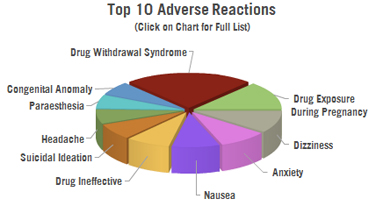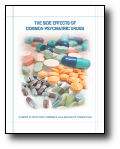 The documented risks of these drugs are provided so the public can make informed, educated decisions. Paxil is a newer antidepressant drug. The U.S. Food and Drug Administration warns that antidepressants can cause suicidal thinking and behavior in children and young adults. Paxil is also known as Aropax, Aroxat, Daparox, Deroxat, Motivan, Optipar, Paroxat, Paroxedura, Paroxetina, Paroxetine, Paxetil, Paxil CR, Pexeva, Sereupin, Seroxat, Tagonis.
The documented risks of these drugs are provided so the public can make informed, educated decisions. Paxil is a newer antidepressant drug. The U.S. Food and Drug Administration warns that antidepressants can cause suicidal thinking and behavior in children and young adults. Paxil is also known as Aropax, Aroxat, Daparox, Deroxat, Motivan, Optipar, Paroxat, Paroxedura, Paroxetina, Paroxetine, Paxetil, Paxil CR, Pexeva, Sereupin, Seroxat, Tagonis.
To see the total figures from IQVia on the number of people taking antidepressants in the U.S., click here.
Please note: No one should attempt to get off of psychiatric drugs without a doctor’s supervision. To help find medical practitioners in your area, click here.
Also, read the FDA’s Paxil Medication Guide for more information. MedGuides include “the particular serious and significant public health concern that has created the need for the Medication Guide” and notes “pediatric risks.” (Note: Unfortunately, the FDA MedGuides only work on a desktop, not on a mobile device. Please complain to the FDA to make their public advisories accessible to all. 1-888-INFO-FDA or 1-888-463-6332.)
Paxil Drug Warnings:
There have been 38 drug regulatory agency warnings from eight countries (Australia, Canada, Germany, Ireland, Japan, New Zealand, United Kingdom and United States) and the European Union on Paxil (or paroxetine). These include the following (note that some warnings cite more than one side effect, so the list below may not be equal to the total number of warnings):
17 warnings on Paxil causing suicide risk or suicidal behavior
11 warnings on Paxil causing newborn complications
9 warnings on Paxil causing birth defects
5 warnings on Paxil causing hostility or aggression
5 warnings on Paxil causing self-harm
4 warnings on Paxil causing withdrawal reactions
3 warnings on Paxil causing agitation
3 warnings on Paxil causing anxiety
2 warnings on Paxil causing involuntary movements
2 warnings on Paxil causing nervous system disorders
2 warnings on Paxil causing abnormal behavior
2 warnings on Paxil causing Serotonin Syndrome
2 warnings on Paxil causing eye problems
2 warnings on Paxil causing infant withdrawal symptoms
1 warning on Paxil causing mania or psychosis
1 warning on Paxil causing sleep problems
1 warning on Paxil causing irritability
1 warning on Paxil having lack of efficacy
1 warning on Paxil causing violence
1 warning on Paxil causing blood disorders
1 warning on Paxil causing sexual dysfunction
1 warning on Paxil causing pregnancy complications
1 warning on Paxil causing Neuroleptic Malignant Syndrome (a life-threatening neurological disorder)
1 warning on Paxil causing birth complications
1 warning on Paxil causing premature birth
Paxil Drug Studies:
There have been 79 studies done in 22 countries (Australia, Austria, Canada, China, Denmark, Finland, France, Germany, Iceland, Israel, Italy, Netherlands, New Zealand, Norway, Portugal, Spain, Sweden, Switzerland, Taiwan, Turkey, United Kingdom and United States) on Paxil (or paroxetine). These include the following (note that some studies cite more than one side effect, so the list below may not be equal to the total number of studies):
20 studies on Paxil causing newborn complications
15 studies on Paxil causing suicide risk or attempts
12 studies on Paxil causing birth defects
6 studies on Paxil causing sexual dysfunction
6 studies on Paxil causing abnormal bleeding
5 studies on Paxil causing withdrawal reactions
5 studies on Paxil causing pregnancy complications
4 studies on Paxil causing risk of fractures
4 studies on Paxil causing premature birth
4 studies on Paxil causing gastrointestinal problems
4 studies on Paxil causing lack of efficacy
3 studies on Paxil causing birth complications
3 studies on Paxil causing nervous system disorders
2 studies on Paxil causing skin conditions
2 studies on Paxil causing developmental disorders
2 studies on Paxil causing risk of falls
2 studies on Paxil causing violence
2 studies on Paxil causing blood disorders
2 studies on Paxil causing involuntary movements
2 studies on Paxil causing weight gain
2 studies on Paxil causing self-harm
2 studies on Paxil causing reproductive system disorders
2 studies on Paxil causing hostility or aggression
2 studies on Paxil causing infant withdrawal symptoms
1 study on Paxil causing diabetes
1 study on Paxil causing homicide or homicidal ideation
1 study on Paxil causing liver problems
1 study on Paxil causing allergic reactions
1 study on Paxil causing cardiovascular disorders
1 study on Paxil causing heart problems
1 study on Paxil causing stroke
1 study on Paxil causing death or increased risk of death
1 study on Paxil causing heart attacks
1 study on Paxil causing impaired driving
1 study on Paxil causing cancer
1 study on Paxil causing seizures
1 study on Paxil causing mania or psychosis
Top Reactions for All Ages: There have been 25,827 adverse reactions reported to the US FDA in connection with Paxil.
The FDA estimates that less than 1% of all serious events are ever reported to it, so the actual number of side effects occurring are most certainly higher.
- 6,250 cases of drug withdrawal syndrome
- 2,778 cases of dizziness
- 2,361 cases of anxiety
- 2,333 cases of nausea
- 2,154 cases of the drug being ineffective
- 1,973 cases of suicidal ideation
- 1,752 cases of headache
- 1,675 cases of paraethesia (abnormal sensation, as prickling, itching)
- 1,628 cases of congenital anomalies (birth defects)
- 1,612 cases of insomnia
Documented Side Effects of Paxil:
Source: Physicians Desk Reference, National Institutes of Health’s Medline Plus, and/or the drug label.
Abnormal bleeding or bruising
Blurred vision
Confusion
Difficulty breathing
Difficulty concentrating
Fainting
Forgetfulness
Hallucinations
Hives
Insomnia
Irregular heartbeat
Irregular heartbeat
Nervousness
Numbness or tingling in your hands, feet, arms, or legs
Peeling or blistering of skin
Seizure
Severe muscle stiffness or twitching
Sudden muscle twitching or jerking that you cannot control
Suicidality
Swelling of the face, throat, tongue, lips, eyes, hands, feet, ankles, or lower legs
Tremor
Unsteady walking that may cause falling
Unusual dreams
Weight loss or gain
Click here to learn more >>
This brochure is a simple guide that documents the dangerous and deadly side effects of the drugs prescribed to millions of men, women and children diagnosed with bogus mental disorders.



 Download The Side Effects of Common
Download The Side Effects of Common
SHARE YOUR STORY/COMMENT